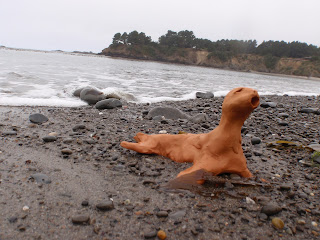I'm missing Scotland and wishing that I'd been in good enough shape to dive the Scapa Flow in Orkney last summer. I was there, but the commuting combined with old sports injuries had really done a number on my back and leg. The long plane ride and the car-hopping across Scotland didn't help either.
(Still in pain, in process.)
Now, Northern California diving is world-class and wonderfully kelpy, but I'm feeling the pull of a missed opportunity, you know?
An Orkney view.
Showing posts with label Orkney. Show all posts
Showing posts with label Orkney. Show all posts
Thursday, January 18, 2018
Friday, July 28, 2017
Saturday, July 15, 2017
Sunday, July 9, 2017
Wednesday, July 5, 2017
Tuesday, July 4, 2017
Stromness Shots
That's a two-way street, by the way.
Motorists are very accommodating of each other in Orkney in particular and in Scotland in general.
Looking out from, more than at:
Stromness,
Orkney.
Orkney Kine
Orkney kine are not the hairy, furry Scottish cattle that one expects. They are multicolored, or of various colors, not the ruddy shade you may expect. And, cattle and sheep alike lie down (lay down--what's that rule?) to avoid the worst of the wind in ways that I am not used to with livestock. I mean, some sheep and cattle flatten themselves like cats or dogs in the sun.
Monday, July 3, 2017
Wednesday, May 31, 2017
Thursday, September 29, 2016
Sunday, January 5, 2014
GMB: "I Gave It Back To The Sea, To Dance In"
BEACHCOMBER
Monday I found a boot –
Rust and salt leather.
I gave it back to the sea, to dance in.
Tuesday a spar of timber worth thirty bob.
Next winter
It will be a chair, a coffin, a bed.
Wednesday a half can of Swedish spirits.
I tilted my head.
The shore was cold with mermaids and angels.
Thursday I got nothing, seaweed,
A whale bone,
Wet feet and a loud cough.
Friday I held a seaman’s skull,
Sand spilling from it
The way time is told on kirkyard stones.
Saturday a barrel of sodden oranges.
A Spanish ship
Was wrecked last month at The Kame.
Sunday, for fear of the elders,
I sit on my bum.
What’s heaven? A sea chest with a thousand gold coins.
--George Mackay Brown
from The Collected Poems of George Mackay Brown
Saturday, December 22, 2012
The Thinker(s): Orkney-Style?
My Pict (pit-fired clay; hammered copper) --
with someone else's Thor in the background.
I must say that my own sense of the Orkneys comes, chiefly, from Dorothy Dunnett's treatment of those fabulous northern islands in her King Hereafter, that wonderful historical novel of Thorfinn of Orkney, of Macbeth, and of the Celtic/Pictish/Norse mixture that infused those islands. Seamus Heaney's brief references in his North, the poetry of Orkney poet George Mackay Brown, Henry Treece's historical novel Splintered Sword, the classic Orkneyinga Saga, and R. E. Howard's Bran Mak Morn have also informed my imagination here.
Unfortunately, I've yet to experience Orkney for myself, though I expect to visit in the next decade or so.
Thor as thinker? More than you might think, surely. Check the Eddas.
Thor as thinker? More than you might think, surely. Check the Eddas.
Saturday, October 27, 2012
"The Music of the Seals"
The seals are very fond of music. Everywhere I went people told me that, but I was never fortunate enough to hear first hand the music that belongs to them. I believe there is music that remains privately in the minds of the country people of the West, but can only give here a few pieces that have found their way into print. I shall put first a ballad, "The Grey Selchie of Sule Skerrie," and, last, a few notes which were sung by a seal off the island of Skomer, Pembrokeshire, in 1946, and recorded there by Dr. Ludwig Koch. These two have moved me more than the others.
--from David Thomson's final chapter -- "The Music of the Seals" -- in his The People of the Sea: A Journey in Search of the Seal Legend.
Counterpoint Press: Washington, D.C.. 2000.
First published in 1954 by Turnstile Press Ltd, in Great Britain; revised editions in 1965 and 1980.
Counterpoint edition features an introduction by Seamus Heaney.
Saturday, September 22, 2012
Dunnett's Macbeth: Thorfinn of Orkney -- A Favorite Passage
Here's a favorite passage from Dorothy Dunnett's King Hereafter, a novel about the historical Macbeth: Thorfinn the Mighty, Earl of Orkney, King of Scotia. Frankly, Dunnett's King Hereafter is one of my Top Ten Novels of All Time, but that's an idiosyncratic list. Still.
Here, we get a crucial insight into the "secret of [Thorfinn's] success", but even as Dunnett provides Thorkel Fostri's bitter assessment, she also provides Tuathal's reflections on what Thorkel says, making a simple statement complex in the best ways. I end up appreciating the insight into the main character, even as I feel for Thorkel's frustration year after year. (And yet Thorkel deserves some of that frustration . . . and if you've read the novel, I'll bet you'd agree. "Year after year" refers both to Thorkel's relationship over time with Thorfinn and to my yearly rereadings.) There are worthy ponderings possible here: about leadership, about problem-solving, and about reciprocity and the mysteries of connection and admiration.
Did [Earl Siward of York] regret his exile? Had he envied Kalv, turning his coat so adroitly over and over, and at least buying back some years at Egge?
'Envy? He despised Kalv. Kalv was a fool,' Thorkel had said. 'There was only one man he envied.'
'He hated Thorfinn? Always? I suppose he must have done,' Tuathal had said, thinking aloud. 'Or the Lady Emma would never have risked making Siward her buffer between the rest of England and Scotia. But then, what if Siward had tried to take over Scotia?'
'Twelve years ago? Against Thorfinn's manpower, and his money, and his fleet? Even with England and Denmark behind him,' had said Thorkel Fostri with scorn, 'I doubt if he would have got a levy over the Forth. And England wouldn't have backed him. Magnus had Norway then, remember, and half a foot in Orkney already through Thorfinn's nephew Rognvald. England would rather have had Thorfinn in Scotia, I can tell you, than Siward or Norway.'
And that, thought Tuathal, was still true. Despite Thorfinn's present weakness, it was still, thank God, true. He had said, 'And Thorfinn? He's used to dealing with princes these days. Does he resent being forced to barter with someone . . . '
He had paused, having caught Eochaid's eye, to rephrase the question, but Thorkel Fostri's voice, at its most sardonic, had taken him up. 'Someone like me, from the barbarous north? Haven't you noticed yet that Thorfinn is prouder of being Earl of Orkney than he is of ruling Scotia? He fought for Orkney and won it, against men just like Siward. His own kind. He knows them too well to despise them.'
His own kind? Thorfinn was three-quarters Celt. They were not his own kind. Tuathal had said, 'So it's just another negotiation? Thorfinn neither likes nor dislikes Kalv's nephew? I find it hard to believe.'
To which Thorkel Fostri had answered in a way he had not expected. 'When did you ever know whether Thorfinn likes or dislikes a man? He takes them for what they are, and deals with them accordingly. It's the secret of his success. You don't fight the sea by getting angry at it, or persuade it to be kinder by loving it.'
The bitterness was plain to all to hear. Eochaid had got up and left, and he, Tuathal, had asked only one or two questions more.
He was not embarrassed. It merely appeared to him a paradox worth someone's attention: how a man such as Thorkel described could inspire what Thorkel undoubtedly felt for him.
Here, we get a crucial insight into the "secret of [Thorfinn's] success", but even as Dunnett provides Thorkel Fostri's bitter assessment, she also provides Tuathal's reflections on what Thorkel says, making a simple statement complex in the best ways. I end up appreciating the insight into the main character, even as I feel for Thorkel's frustration year after year. (And yet Thorkel deserves some of that frustration . . . and if you've read the novel, I'll bet you'd agree. "Year after year" refers both to Thorkel's relationship over time with Thorfinn and to my yearly rereadings.) There are worthy ponderings possible here: about leadership, about problem-solving, and about reciprocity and the mysteries of connection and admiration.
I'm putting Dunnett's passage below the photo of knife and novel. (The point of view, here, is that of Tuathal, Prior of St. Serf's, as the POV shifts throughout the novel, usefully so.)
'Envy? He despised Kalv. Kalv was a fool,' Thorkel had said. 'There was only one man he envied.'
'He hated Thorfinn? Always? I suppose he must have done,' Tuathal had said, thinking aloud. 'Or the Lady Emma would never have risked making Siward her buffer between the rest of England and Scotia. But then, what if Siward had tried to take over Scotia?'
'Twelve years ago? Against Thorfinn's manpower, and his money, and his fleet? Even with England and Denmark behind him,' had said Thorkel Fostri with scorn, 'I doubt if he would have got a levy over the Forth. And England wouldn't have backed him. Magnus had Norway then, remember, and half a foot in Orkney already through Thorfinn's nephew Rognvald. England would rather have had Thorfinn in Scotia, I can tell you, than Siward or Norway.'
And that, thought Tuathal, was still true. Despite Thorfinn's present weakness, it was still, thank God, true. He had said, 'And Thorfinn? He's used to dealing with princes these days. Does he resent being forced to barter with someone . . . '
He had paused, having caught Eochaid's eye, to rephrase the question, but Thorkel Fostri's voice, at its most sardonic, had taken him up. 'Someone like me, from the barbarous north? Haven't you noticed yet that Thorfinn is prouder of being Earl of Orkney than he is of ruling Scotia? He fought for Orkney and won it, against men just like Siward. His own kind. He knows them too well to despise them.'
His own kind? Thorfinn was three-quarters Celt. They were not his own kind. Tuathal had said, 'So it's just another negotiation? Thorfinn neither likes nor dislikes Kalv's nephew? I find it hard to believe.'
To which Thorkel Fostri had answered in a way he had not expected. 'When did you ever know whether Thorfinn likes or dislikes a man? He takes them for what they are, and deals with them accordingly. It's the secret of his success. You don't fight the sea by getting angry at it, or persuade it to be kinder by loving it.'
The bitterness was plain to all to hear. Eochaid had got up and left, and he, Tuathal, had asked only one or two questions more.
He was not embarrassed. It merely appeared to him a paradox worth someone's attention: how a man such as Thorkel described could inspire what Thorkel undoubtedly felt for him.
Labels:
10th Century,
Celtic,
Character,
Dunnett,
Heroes,
Historical,
History,
King,
Macbeth,
Mystery,
Novel,
Orkney,
Problem-Solving,
Reciprocity,
Thorfinn,
Vikings
Subscribe to:
Posts (Atom)
















































